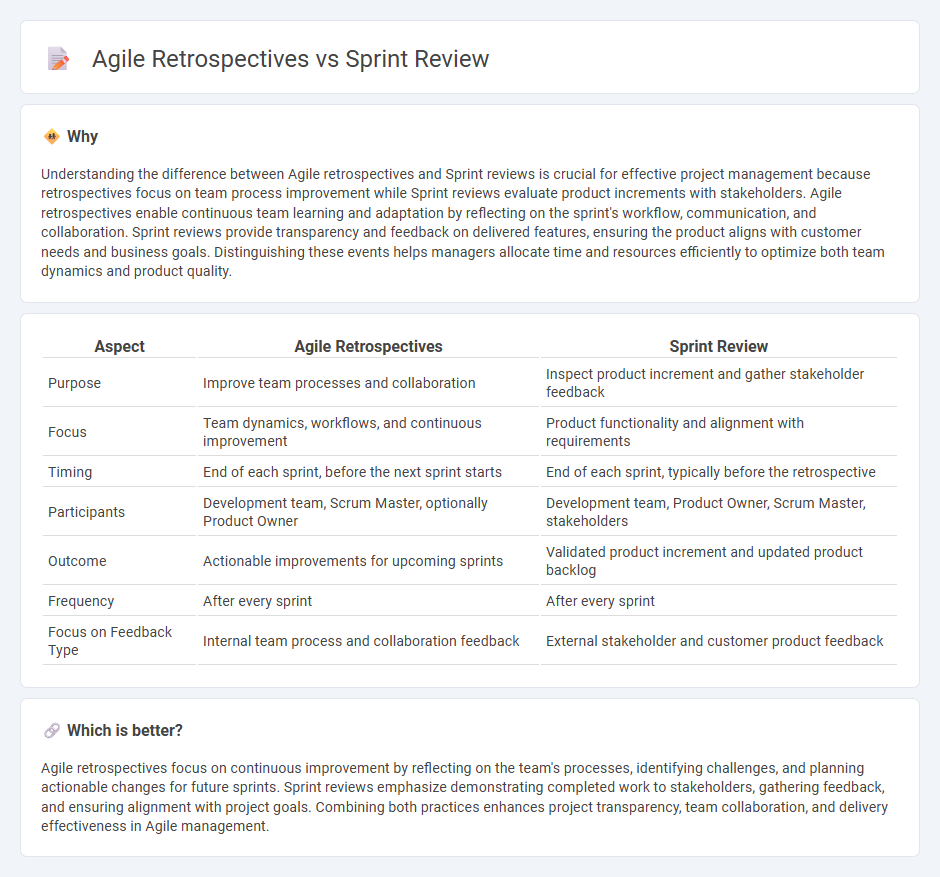
Agile retrospectives focus on continuous improvement by reflecting on team processes and collaboration at the end of each sprint, aiming to identify actionable changes. Sprint reviews concentrate on demonstrating completed work to stakeholders, gathering feedback, and aligning the product with customer needs. Discover how both practices drive effective Agile project management and enhance team performance.
Why it is important
Understanding the difference between Agile retrospectives and Sprint reviews is crucial for effective project management because retrospectives focus on team process improvement while Sprint reviews evaluate product increments with stakeholders. Agile retrospectives enable continuous team learning and adaptation by reflecting on the sprint's workflow, communication, and collaboration. Sprint reviews provide transparency and feedback on delivered features, ensuring the product aligns with customer needs and business goals. Distinguishing these events helps managers allocate time and resources efficiently to optimize both team dynamics and product quality.
Comparison Table
| Aspect | Agile Retrospectives | Sprint Review |
|---|---|---|
| Purpose | Improve team processes and collaboration | Inspect product increment and gather stakeholder feedback |
| Focus | Team dynamics, workflows, and continuous improvement | Product functionality and alignment with requirements |
| Timing | End of each sprint, before the next sprint starts | End of each sprint, typically before the retrospective |
| Participants | Development team, Scrum Master, optionally Product Owner | Development team, Product Owner, Scrum Master, stakeholders |
| Outcome | Actionable improvements for upcoming sprints | Validated product increment and updated product backlog |
| Frequency | After every sprint | After every sprint |
| Focus on Feedback Type | Internal team process and collaboration feedback | External stakeholder and customer product feedback |
Which is better?
Agile retrospectives focus on continuous improvement by reflecting on the team's processes, identifying challenges, and planning actionable changes for future sprints. Sprint reviews emphasize demonstrating completed work to stakeholders, gathering feedback, and ensuring alignment with project goals. Combining both practices enhances project transparency, team collaboration, and delivery effectiveness in Agile management.
Connection
Agile retrospectives and Sprint reviews are connected as essential feedback mechanisms within the Scrum framework, both aiming to enhance team performance and product quality. Sprint reviews focus on inspecting the increment and gathering stakeholder feedback on the product, while retrospectives concentrate on reflecting internally to improve team processes and collaboration. Together, they create a continuous improvement loop that drives adaptive project management and fosters transparency.
Key Terms
Feedback
Sprint reviews center on gathering stakeholder feedback about the product increment to ensure alignment with project goals and customer expectations. Agile retrospectives emphasize team feedback to identify process improvements, enhance collaboration, and address challenges encountered during the sprint. Explore how these feedback mechanisms boost productivity and product quality in agile development.
Continuous Improvement
Sprint reviews emphasize stakeholder feedback and product increment evaluation to ensure alignment with project goals and deliverables. Agile retrospectives concentrate on analyzing team processes, identifying bottlenecks, and fostering continuous improvement in collaboration and efficiency. Explore deeper insights into how sprint reviews and retrospectives drive effective Agile workflows and enhance team performance.
Stakeholders
Sprint reviews center on stakeholders by showcasing completed work and gathering direct feedback to align the product with business goals and customer needs. Agile retrospectives prioritize the internal team's process improvement and collaboration, fostering a culture of continuous development and efficiency. Explore detailed strategies to maximize stakeholder engagement and team growth in your Agile practices.
Source and External Links
Sprint Reviews - A video discussing the importance of Sprint reviews in Scrum, highlighting their role in inspecting the outcome of a Sprint and gathering stakeholder feedback.
Sprint Reviews: A Guide for Agile Teams - A comprehensive guide to Sprint reviews, focusing on their benefits in establishing an iterative feedback loop and enabling adaptability in Agile environments.
What is a sprint review? - A detailed explanation of Sprint reviews, including their definition, purpose, and best practices, emphasizing their role beyond just a demo in Agile development.
 dowidth.com
dowidth.com